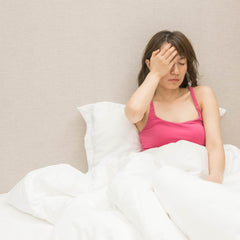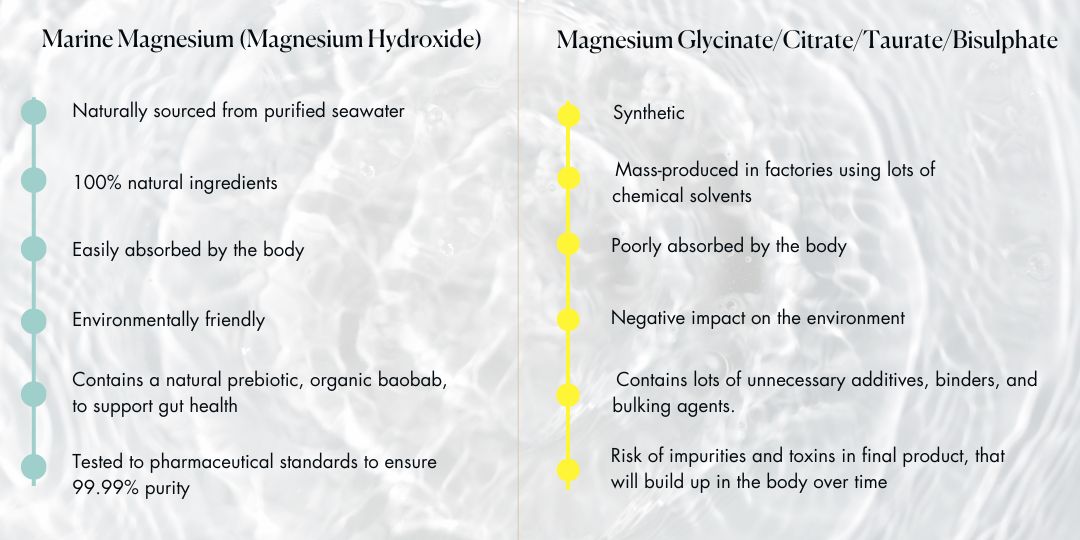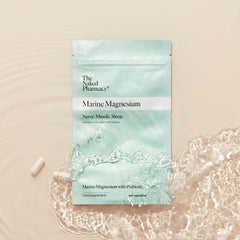Hitting the spot: A natural solution for low libido
Clearly, the world loves listening about sexual healing, then why are we so scared to talk about it?
Traditional treatments focus on just one system of the body, increased circulation.
In reality, libido is a delicate interplay of four key systems in the body.
This four-fold chart represents our interconnected systems of libido, desire and sexual energy.
When you look at this chart, you can see why many of us don’t talk about it.
Female libido is complex, multi-layered and always evolving.
So, what affects libido in women?
This flow chart helps explain this complexity:

Hormonal system
“Women produce three to four times as much testosterone than oestrogen before the menopause.”
What effect do our hormones have on our libido?
Oestrogen, progesterone, and testosterone all affect sexual desire and arousal.
Below is a study that explains how women need a specific balance between oestrogen and testosterone, which is unique to each individual.
Increasing women’s sexual desire: The comparative effectiveness of oestrogens and androgens.
Do women need testosterone?
While testosterone is more commonly associated with men, women need testosterone too. In fact, women produce 3 times more testosterone than the female sex hormone oestrogen before menopause.
Testosterone is produced by ovaries, adrenal glands and the brain, but levels decline around the time of the perimenopause and menopause and stay low thereafter. This fall in testosterone can lead to a lack of energy, brain fog, reduced libido and a lack of purpose and confidence.
Many other factors can also influence testosterone levels regardless of age such as obesity, diabetes, and lifestyle factors.

What could we be doing naturally to promote or improve this balance between our hormones?
For many people, small and simple lifestyle changes can help support healthy hormone levels in the body and ensure that all our body systems are working at their optimal level. A well-balanced diet and healthy habits may improve your hormonal health and allow you to feel your best.
Here are 10 tips to naturally support your hormone balance:
1. Consume enough protein, aim for around 30-35 grams.
Proteins provide amino acids that your body cannot make on its own and are needed to produce peptide hormones. These hormones play a crucial role in regulating several physiological processes, including growth, energy metabolism, appetite, stress, and more. Current research is emerging showing that most of us are not consuming enough daily protein and should aim for around 30-35 grams per meal to maintain muscle strength, bone health, and other functions.
2. Exercise regularly and focus on strength building.
Physical activity and building muscle strength not only influences your hormonal health, but also is a healthy ageing strategy.
3. Maintain a healthy weight.
Weight gain is directly associated with hormonal imbalances. Obesity relates to a lack of ovulation in women. Do explore our Metabolic Gold supplement if you are concerned about insulin resistance, over health and weight gain.
4. Watch your gut health.
The gut produces numerous metabolites that affect hormone health and processes of the vagus nerve. A healthy gut biome can support emotional health, hormonal health and all your body's systems. Do explore Gut Love our award winning supplement to support your gut with organic slippery elm, prebiotics and probiotics.
5. Conscious intake of processed sugar.
Processed sugar (this also includes wine) promotes insulin resistance, and fructose intake is linked to disruptions in the gut microbiome, ultimately leading to hormonal imbalances. Minimising this intake can improve energy, skin and sleep.
6. Reduce stress in imaginative ways.
Stress can significantly harm the body’s hormones. Finding techniques that can help to decrease stress can really help your quality of life and relationships, be creative it could be painting by numbers, walking, breathing, rocking out to music whatever you can fit into your daily life, just schedule it in and prioritise it. You may find that Saffrosun Calm helps alleviate nervousness, maintain emotional balance and support good sleep as it addresses your cortisol levels.
7. Get enough sleep.
A good sleep routine is a really important habit one of the most important factors not just in hormonal imbalance, but also your quality of life. It is worth exploring what works for you it maybe blackout blinds, or eye masks, magnesium or a hot bath and some lavender tea.
8. Eat healthy fats.
Healthy fat intake can work to maintain balanced hormones that are involved with appetite, metabolism, and feeling full and is so important for healthy body and brain function. We don't need to demonise all fats, because they are critical for our health, and low fat products are typically full of processed ingredients.
9 Eat plenty of fibre at least 30g a day *
Fibre plays a huge role in gut health, helping regulate hormones like insulin and keeping you full for longer. Eating plenty of fibre is associated with a lower risk of heart disease, stroke, type 2 diabetes and bowel cancer.
10. Hydration 6-8 glasses a day
Drink enough water so your urine is a pale yellow colour is the aim, however vegetables, fruit and soups etc also contribute to this target. Fluids will support skin health, bone health and will help flush out toxins and producing healthy easy stools.

Ingredient focus for Ashwadisiac for Women:
Our potent supplement has been crafted to energise and restore the four vital systems of the body, promoting balance, vitality and overall well-being.
The four ingredients of our supplement are Fenugreek for hormonal health, Gingko Biloba for circulatory health, Ashwagandha for the nervous system and Saffron for emotional health.
Fenugreek
Fenugreek (Trigonella foenum greacum) has been used in traditional medicine and many of us are familiar with using this Indian spice in cooking.
However, Fenugreek extract has many health benefits the seed powder is rich in the bioactive saponin glycosides and ours is at the high strength of 60%.
Clinical trials have shown Fenugreek extract helps balance hormone levels, such as oestrogen and testosterone improving symptoms of low libido as well as enhancing energy levels and exercise endurance.
Fenugreek is also particularly beneficial for managing hormonal symptoms such as hot flushes, low mood, night sweats, and poor sleep.
Below is a study highlighting how fenugreek can help with sexual desire in women.
It specifically highlights the health benefits of fenugreek including the regulation of sex hormones.
Properties of Fenugreek: A Review (openbiologyjournal.com)
Circulatory System
What effect does our circulation have on our libido?
Women may suffer from low sex drive, because of reduced blood flow which may prevent sexual arousal and cause vaginal dryness discomfort.
Growing older, being under severe or chronic stress, or having certain medical conditions such as diabetes and atherosclerosis might also contribute to inhibited blood flow.
To address this problem, urologists may recommend topical applications to dilate the blood vessels, increase blood flow, and improve sensitivity and arousal, or prescribe HRT or vaginal pessaries.
What could we be doing naturally to promote or improve our circulation, with regards to libido?
Exercising can help improve blood flow as it also helps to increase testosterone and muscle strength is critical to overall health and quality of life as we get older.
Medications can affect libido, in particular antidepressants. According to the *American Journal of Psychiatry "70% of women taking antidepressants** (especially SSRIs) report experiencing sexual side effects, including low libido"

Ingredient focus for circulatory system: Ginkgo Biloba
Ginkgo Biloba, also known as the maidenhair tree, is an ancient tree native to China estimated to have existed for over 270 million years.
The leaves of the Ginkgo Biloba tree have been used in traditional Chinese medicine for centuries and have become a focus of research in recent years for their active compounds, terpene lactones and flavone glycosides.
Ginkgo Biloba contains powerful antioxidants that promote blood flow, circulation, cognitive function, reduce stress, and anxiety, help focus and improve sex drive and desire.
Ginkgo Biloba contains bioactives that improve levels of nitric oxide, a compound responsible for dilating blood vessels. This in turn improves circulation making Ginkgo an effective ingredient for symptoms of sexual dysfunction caused by poor circulation.
The study below explains that when combined with sex therapy, long-term Gingko Biloba treatment significantly increased sexual desire and contentment beyond placebo.
Short- and long-term effects of Ginkgo biloba extract on sexual dysfunction in women
Nervous System
What role does our nervous system play in our libido?
Much of the hormone regulation in our bodies is regulated by the nervous system. Even hormones like oxytocin, aka “the love hormone” are under the whim of the nervous system, and its ability to function effectively.
Given that the nervous system controls so much of how our bodies work, it makes sense that it also has a huge impact on sexual desire, energy levels and connection.
The limbic system helps regulate parts of the autonomic nervous system, which is responsible for regulating autonomic bodily responses like breathing, blood pressure, and pulse. Thought of as the “primitive” area of the brain, the limbic system, also plays a role in physical drives and emotional processing – and is activated during intimacy.
Sometimes our nervous system becomes dysregulated. Whether that be through trauma, physical or mental stress, injury, medication or hormonal fluctuations.
When the nervous system isn’t working optimally, it can affect how and when we become aroused, our sexual responses, our comfort levels in intimacy with others, and so much more.
Adrenaline, the stress hormone, actually inhibits oxytocin. Given that oxytocin helps facilitate trust, sexual activity, and orgasm, high amounts of stress hormones from a dysregulated nervous system, can make it difficult to feel connected.
What could we be doing naturally to promote or improve our circulation, with regards to libido?
The ability to relax into the moment, allows us to experience more pleasure throughout life .
Knowing what puts you in a state of stress, and what brings you ease, helps you to relax and be comfortable with your self and this in turn makes you wish to perhaps find the opportunities to connect with others in both a social setting and then perhaps a romantic one.

Ingredient focus for hormonal balance: Ashwagandha
Ashwagandha (Withania somnifera) is a popular herb that has been used in Ayurvedic medicine for centuries.
Ashwagandha has adaptogenic properties meaning it uses its natural intelligence to allow the body to absorb or excrete just the right amount of herb on any given day.
It supports the nervous system to cope with stress, by reducing our body’s natural cortisol levels (the stress hormone). It also has aphrodisiac qualities that can enhance libido and overall sexual wellness.
Ashwagandha influences the balance of neurotransmitters like serotonin, dopamine, and GABA, which are crucial for mood, relaxation, ability to experience pleasure and cognitive function.
It also reduces levels of pro-inflammatory cytokines, which help to protect the nervous system from inflammation-related damage.
Below is a study highlighting that after 8 weeks of continuous use of Ashwagandha produced a statistically significant improvement in patients as compared to placebo.

Ingredient focus for sensory and nervous system: Saffron
Saffron is a spice from the Crocus Sativus flower and is derived from the stigma - called threads - within the flower itself.
The harvesting process is very labour intensive, each crocus sativus flower contains 3-4 stigmas which are hand-picked and dried under controlled conditions.
There are three key bioactives associated with saffron. Crocin, a water-soluble carotenoid, picrocrocin and thirdly, safranal which is formed as a result of the drying process of picrocrocin.
Most saffron supplements on the market contain only one bioactive safranal.
However, we have incorporated the powerhouse of all three bioactives (crocin, picrocrocin and safranal) at a much higher concentration than in our other saffron products.
Untreated anxiety or depression can contribute to sexual dysfunction, as can long-term stress. Our saffron extract supports emotional balance and the formula is targetted to reduce stress-related sexual health problems.
Saffron harnesses adaptogenic properties, supporting our bodies to better cope with stress and regulate neurotransmitters such as dopamine, serotonin and norepinephrine.
Saffron has been shown to have particularly aphrodisiac properties for people taking antidepressant medication.
In addition, Saffron helps reduce the reactivity of the nervous system to stress, because it helps the body to cope better and react better to nervousness and mood imbalance.
Below is a study that included thirty-eight women with major depression who were stabilised on fluoxetine 40mg/day for a minimum of 6 weeks and had experienced subjective feelings of sexual dysfunction entered the study. The patients were randomly assigned to saffron or placebo for 4 weeks.
Results showed that the patients receiving saffron experienced statistically significant improvements in sexual problems.

There is no quick fix, but we can help
Ashwadisiac for Women is our product to help improve low libido, hormone balance and energy.
100% natural it contains the most potent mix of ingredients at a strength and formulation that you can trust, always tested to make sure there are no nasties just strong naturally powerful content.
The bioactives contained in the ingredients for Ashwadisiac for Women ensure that consistent intake will support the four key systems in the body that will have the greatest impact.
Our Ashwagandha Root & Leaf Extract contains 35% of the bioactives, Withanolides (this is 7 times stronger than any standard ashwagandha supplement).
The Fenugreek contained in our Ashwadisac for women contains 60% of the bioactives, saponins and is a unique, standardised fenugreek supplement on the market.
The Saffron used in our Ashwadisiac for Women contains the highest concentration of the three bioactives mentioned above at 10.5%.
Finally, our Gingko Biloba contains 24% glycosides and 6 % terpene lactones and again like our fenugreek contains a unique, standardised dose.
Women deserve more!
Women deserve to feel more confident, feel more energy, more passion, and more desire.
Speak to our expert pharmacists today
Our registered pharmacists are available for free expert advice and to answer all your questions about your health and your current medications, so that you can feel fully supported on your health journey.
Our pharmacists are on hand Monday – Friday 9 am – 5 pm. Book your free consultation today! Book Now!















